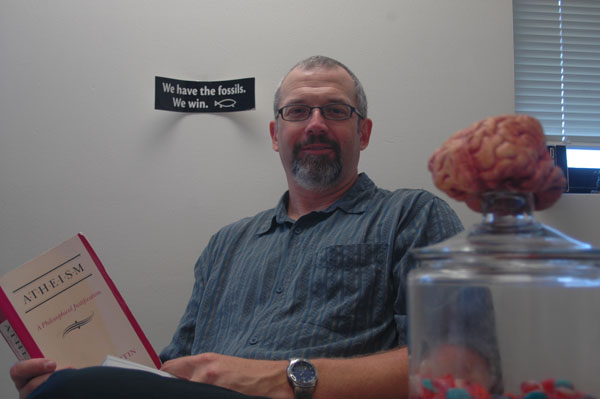Atheism: teaching a taboo

Matthew McCormick’s atheism seminar is offer at Sacramento State for the first time. “If a philosophy class isn’t making you uncomfortable, it’s not doing its job,” he said.:
September 21, 2007
He’s a father, a husband and a writer. But he’s also tackling a taboo subject at a university: atheism.
“If a philosophy class isn’t making you uncomfortable, it’s not doing its job.” said Matthew McCormick, an associate professor of philosophy.
McCormick is teaching the first atheism class ever offered at Sacramento State. And the topic, he said, makes some uncomfortable, even hateful.
“Some recent polls show that atheists are the most reviled people in American society, even more than homosexuals and minority groups? That all suggests that we’ve got some irrational and dangerous commitments surrounding the topic of God,” McCormick said.
The word atheist is defined as “someone who asserts that there is no such being as God” according to The Presumption of Atheism by Anthony Flew, an article from postiveatheism.com. The Association of Religion Data Archives at thearda.com states that nonreligious people make up for 9.26 percent of the U.S. population.
McCormick takes on this controversial topic with his own no-nonsense style, high energy and motivation, in hopes that students will understand the importance of studying atheism today.
McCormick said that one of his students taking the atheism class told his friend he was in the class, and his friend just took a big step back.
McCormick is not a radical preacher of atheism who goes around screaming “There is no God” trying to scare his students and convert them to atheism. McCormick proclaimed himself an atheist at age 16, but he said he’s not going to try to convert students to the belief. “Conversion is not the goal,” he said.
He took the initiative to write the proposal for his new atheism class, even though he says he did get “a few raised eyebrows” along the way. Philosophy Chair Thomas Pyne, a colleague and a church-goer, said “I was for it (the class)…it’s certainly a live issue right now.”
Although McCormick is teaching a controversial subject, he still describes his department and students as being very supportive.
Steve Owen, a senior philosophy and English major, has taken four classes with McCormick and said that although McCormick has his own opinions on things, he’s not biased.
“Sometimes I want him to hit hard on something that I believe in, but he doesn’t. He has a strong opinion, but he is so objective in class that you don’t really get a sense of it. He makes jokes, but he stays very objective,” Owen said.
McCormick is not your typical philosophy teacher; after speaking with him for just a few minutes you might get the impression that he would be ready to jump into a philosophical debate at any hour of the day, and that he could master either side of the argument.
“What he is very good at, is how to conduct disagreement on a very high level without becoming enemies,” Pyne said.
Even though McCormick is personable with his students, both students and faculty agree that he demands a lot of hard work in his difficult courses. At the same time, students said they seek him out as a professor because he gives them inspiration.
For some, McCormick is the reason they majored in philosophy.
Pam Dunker, a philosophy major went out of her way to take classes from McCormick.
“I used to be an art major, but I would still take philosophy classes to have him as a teacher,” she said. Dunker also mentioned the satisfactory feeling from receiving a good grade in his class, because he is a difficult grader and she knew she earned it.
He has written several articles that have been published in anthologies. He also has a blog at atheismblog.blogspot.com. McCormick said he is currently working on a book called “Atheism: Proving the negative.”
McCormick cannot think of a bigger question of whether or not God exists.
“There’s just nothing that could matter more for people personally, socially, morally and philosophically,” McCormick said.
Kate Jones can be reached at [email protected].




























































































































